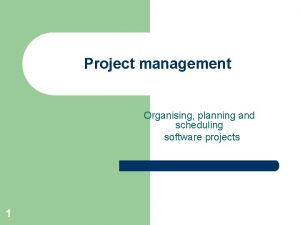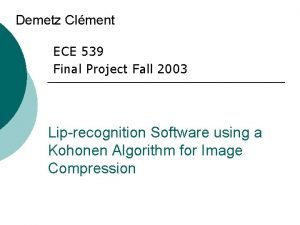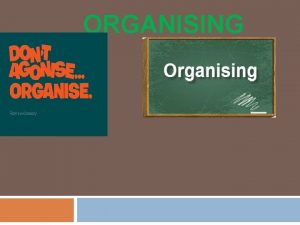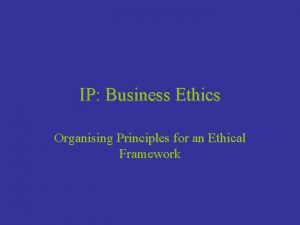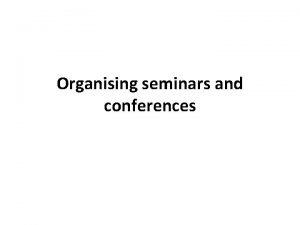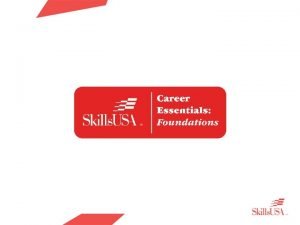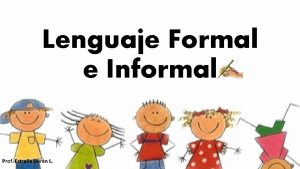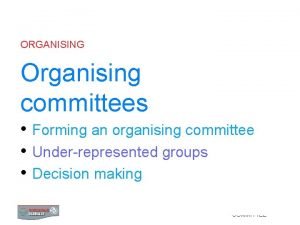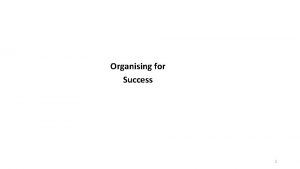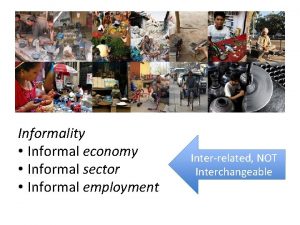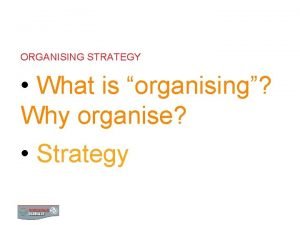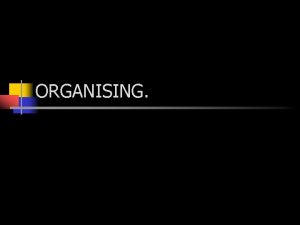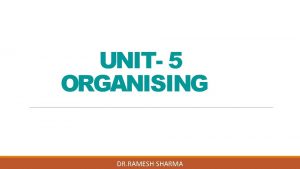ORGANISING IN THE INFORMAL ECONOMY Outline What is













- Slides: 13

ORGANISING IN THE INFORMAL ECONOMY

Outline What is organising Organising as an art Approaches to negotiations; position and interest Question and answer 2

What Negotiation is Negotiations is a process when two or more parties meet each other to get agreement over the use of distribution of a particular resource, the granting of a right e. t. c. In a negotiation each party seeks to advance their own interest. Negotiations can be between individuals or on behalf of a group. In unions we talk about collective bargaining i. e. negotiating for the collective rather than fro individual interests 3

Power is the underlying dynamic of negotiations The underlying dynamic in most negotiations is the relative power of the parties. Some times this is obvious at other times it is more hidden. The relative power often determines the form and content of the negotiations. For example if one party is extremely weak and the other extremely strong, the stronger party will determine what is to be negotiated, how it should be negotiated and even when or whethre it should be negotiated at all. The powerful party will also dictate the terms of implementing the agreement. 4

The weak can use negotiations to build power It is possible in the process of negotiations for the weak to develop power. This depends for example on; Their negotiations strategy, i. e. how they frame their demands Their understanding of the issues being negotiated Their understanding of the positions and interests of the other party, their strengths and weaknesses The tactics in the negotiations i. e. how well they present their case whether they are able to win support among the other side, divide them, appear to be conciliatory, appear to be stronger than they really are e. t. c Whether they could use the negotiations to win support and unite their members Whether they are able to use the negotiations to win support among the community who may be able to influence the negotiations either directly or indirectly. 5

Negotiating is a skill but also an art Negotiating is a skill to be learnt. There are rules, procedures to be followed, research to be done, and framing of demands and arguments. All these can be learnt and developed through practice. At the same time, negotiating is an art, it depends as much on personal style, flair, charisma, the ability to think imaginatively and creatively, the courage and strength of the negotiator to hold ground or to give way at the right time. The power of the union negotiations team depends on the state of their organisation of workers. Because the trade union has longer term goals within industry and the economy, a specific negotiation is not simply an end in itself but also a means to building stronger organisation and power fro more successful negotiations over time. 6

Approaches to negotiations: position and interest Some negotiators distinguish between a position and interest and argue that if we focus on the interests of the parties we sill be able to create mutually acceptable agreements. For example a supervisor is alleged to have sexually harassed a women worker. The Union position: We want the supervisor fired and The Directors Position: He does now want the supervisor fired but transferred. 7

What interest underlies the unions position? The union wants to end sexual harassment and feel if the supervisor is dismissed this will send a message to other supervisors to stop their practice. While they are concerned with the incident they are facing, their interest is to ensure that it does not recur in future 8

What interest underlies the Directors Position? He fears that if he pushes the supervisor he will lose the support of the management tem. He is however fully in support of the workers concern with sexual harassment in the workplace and is open to suggestions on how this practice could be curtailed. If the parties focused on their Positions they w ill not get to a solution except through a power struggle. If however they focused on their interests they may arrive at an option in which the supervisor is transferred and the management agrees to a code of conduct and procedure and an external arbitrator to deal with sexual harassment disputes. 9

The interest based approach to negotiations: 1. The negotiations in this case must follow a set of systematic steps; State your issues Set out clearly the issues, topics or subject that you are to negotiate on 2. Make clear all interests Think about the following when you are preparing and negotiating; What are your interests What are the interests of the other party What interests do you share in common what are your worries, fears, concerns. 3. Create Options Think about options that can bring about a settlement. Explore all answers and possibilities not simply those that are simple and popular 10

Continued… 3. Think about standards These are objective ways that will allow you to decide whether an option should be adopted or not. These could be rules or the outcome of respected research. Standards are respected criterion, which all parties can accept 4. Settlement Use the standards to agree on options created 11

8 point checklist for negotiations process What is the member’s mandate? Who is (or are) the other party in the negotiations? Is it a bilateral or multi-lateral negotiation? What is to be achieved in the negotiations? What is being sought? What is being done to prepare for the negotiations? Where and how is membership involvement built in? How do the negotiations fit in with other activities and campaigns? What follow-up and report-back measures have been noted? 12

THANK YOU FOR YOUR ATTENTION!! 13
 Schedule project management
Schedule project management Self organising map
Self organising map Difference between accountability and responsibility
Difference between accountability and responsibility Staffing and controlling
Staffing and controlling Organising principles
Organising principles Organising a seminar
Organising a seminar Directing function of management
Directing function of management Planning and organizing in the workplace
Planning and organizing in the workplace Athenian economy vs sparta economy
Athenian economy vs sparta economy The quote sandwich example
The quote sandwich example Informal outline example
Informal outline example Inculta formal
Inculta formal Thẻ vin
Thẻ vin Thể thơ truyền thống
Thể thơ truyền thống
